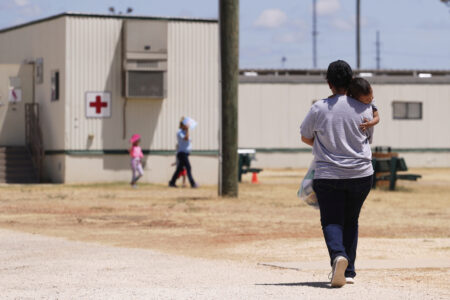Son faults home life
NASHUA – Christopher Gribble said he had a hard life. His parents were unfair and kept him at home doing schoolwork and chores instead of spending time with friends his own age.
His mother abused him, he said. She made him lug around a vacuum cleaner when he was barely more than a toddler and clean the stairs in their Utah home.
Even worse, he said, was when she would hold him down on the couch, examine his arms and legs and back for acne pimples, and lance them painfully if she found one. She made him sit in front of her and would use tweezers to pull hairs out of his head that she said were infected.
Just being in same room as his mother makes him “agitated” and “very upset.”
His father also treated him unfairly, he said. His father was all too ready to believe other people’s stories about things they said his son did. He always had to prove his innocence.
When Gribble met Steven Spader at the Cub Scouts in Brookline, he immediately liked him.
“He was just a funny guy. He was fun to be around,” Gribble said. “It was nice to be around someone who was joking all the time even when things weren’t fun.”
Gribble talked a lot while he was on the stand during the third day of his own insanity trial for the Oct. 4, 2009 murder of Kimberly Cates and attack on her daughter Jaimie, then 11. He spoke in detail about several of the groups he liked being involved in and how proud he was to have become an Eagle Scout and of his accomplishments at a military cadet summer camp he attended.
He also spoke of abuse, revenge and fantasies about cutting his mother into little pieces.
Gribble insisted his mother physically abused him and “lies through her teeth,” acting the part of a sweet, innocent mother to everyone else.
“Even if she’s lying through her teeth, even if you catch her at it, she’ll come up with something,” he said.
He said he was 14 by the time he was big enough to protect himself and, that was around the time he started thinking about ways to torture and kill her as a way to relieve the anger that built up inside him.
“And it felt really good to think about it, like I could finally get rid of this thing in my life,” Gribble said. “It was daily stress.”
It was then that he realized he wasn’t entirely normal, Gribble said.
“I’ve known I was not the normal type of guy for years. That was kind of a hint,” he said.
The Gribbles lived in Utah until Gribble, now 21, was around 8 years old. They moved to Brookline when his father, Richard Gribble, a volunteer EMT in Brookline and computer programmer, was transferred to a Lockheed Martin facility in Nashua, Gribble said.
“From my perspective, it was brutal,” he said of his time in Utah.
Aside from the physical abuse, Christopher Gribble said his parents didn’t believe him after two women, several years apart, complained about him groping them. One of the women Gribble met in a role-playing game store in Nashua. The other was a family friend from the Church of Latter-day Saints.
“My dad being my dad was ready to believe anything bad of me,” he said of the allegations from the first woman, who complained when he was around 11. “I’ve always had to prove myself innocent to him. It sticks out in my mind because it was so unfair to me.”
Gribble didn’t want to give the name of the second woman, whom he said encouraged the groping and was upset when he broke it off. He said he knows her kids and didn’t want to embarrass them in front of reporters and a television camera.
It was that incident, four years ago, that prompted his parents to make an appointment to see a therapist with Latter-day Saints Counseling. That therapist referred him to Counseling Center of Nashua after he talked about killing his parents.
Gribble smiled several times during his testimony, including when he talked about the methods of torture he envisioned using against his mother as a way to get back at her for the alleged abuse, including cutting her, dislocating her arms, pouring boiling water on her and listening to her scream. He thought of, “telling her, ‘hey, how’s it feel now,’” he said, grinning from the witness stand.
Gribble was still going to church regularly and participating in the Boy Scouts at that time. His attorney, Donna Brown, asked if that ever seemed strange to him when he was fantasizing about hurting his mother.
“I’m not sure I ever connected the two,” he said. “That’s an interesting thought. Hmm.”
Gribble’s mother, Tamara Gribble, testified right before him and told a very different version of events.
She said she home-schooled her younger son because he was very smart and the schools in Utah didn’t have programs for gifted students. When the family moved to New Hampshire, she worried about him being around drugs and alcohol, she said.
She and her husband always encouraged Christopher Gribble to have different friends and tried to make their home a welcoming place, she said.
She told the story of when she broke a wooden spoon spanking Christopher Gribble when he was around 5 and she became frustrated trying to potty train him and his attitude about it.
She was ashamed of that day, she said, crying on the stand. She saved the two pieces of the wooden spoon in a dresser drawer as a reminder and never again spanked her sons in anger, she said.
Christopher Gribble had a number of friends through the church, his involvement with Boy Scouts, Dungeons and Dragons, a fantasy role-playing board game, and a military cadet training program. He had his sights set on becoming a Marine, she said.
The doctors at Counseling Center of Nashua would not tell her their diagnosis or treatment recommendations because of privacy concerns, and Christopher Gribble would not talk about it either.
He moved out of their Brookline home around the end of November 2008 and stayed with a family in Nashua after having an argument about a pornographic tape she found in his room. He told people she had made the tape and planted it in his room, she said.
When he moved back home in July 2009 he was spending a lot of time with Spader, including driving Spader to a local technical college where he was taking classes.
He was also angry about moving back home, chafed at having to follow rules and do chores and was openly defiant, Tamara Gribble said. It got worse when he started spending time with Spader, she said.
“He changed. He changed a lot,” she said. “It was almost like a personality change.”
And he was acting normal when he came home the morning of Oct. 4, a few hours after murdering Kimberly Cates and trying to do the same to Jaimie Cates with his father’s old Boy Scout knife. He sat at the kitchen table eating breakfast, Tamara Gribble said, and told her she couldn’t tell him what to do. He told her he had spent the night with Spader and some other friends watching videos, she said.
“We could not believe it when he was arrested. We thought there had to be some mistake,” Tamara Gribble said. “It couldn’t have been him. I couldn’t believe that anyone could take a human life and not be distressed to their core. I couldn’t imagine someone taking a human life and being calm.”
The court has sequestered the Gribbles since they are on the defense’s witness list, which means they are barred from attending the trial, talking to anyone about it or reading media accounts of what goes on. That has not been easy, Tamara Gribble said.
“I want to know what’s going on. He’s my son,” she said. “There’s no power in heaven or earth that can make me stop loving my son.”
A psychologist from the Counseling Center of Nashua who administered a battery of psychological tests to Christopher Gribble in 2007, Dr. Alan Gladsden, testified Monday morning.
He said there was no evidence of child abuse except for what Christopher Gribble himself said. There were many inconsistencies in his explanation of why the two women accused him of touching them, Gladsden said.
The test results showed Christopher Gribble as normal in many areas but scored very high on a scale testing for sociopathic traits.
“He spiked that pretty high,” Gladsden said. “It was a high elevation, one of the highest I’ve ever seen.”
Someone that tests that high on that scale is, “someone who lacks capacity for empathy, remorse for their actions,” he said.
Those individuals would also display poor judgment, be impulsive and angry, ignore rules and laws and would understand right from wrong but only by what people tell them, not from having internalized it.
He didn’t find any evidence of mood or thought disorders, Gladsden said.
Gladsden recommended long-term psychotherapy and thought a close and trusting relationship with a therapist might keep Christopher Gribble from acting on his anti-social urges.
“It’s a grim prognosis, I’m not going to lie to you, but we had to try something,” he said. “He did impress me as someone who could possibly make a connection.”
The first witness of the day, Dr. Grace Tallarico, is a psychiatrist who was finishing testimony she began Friday. Although she is a clinical psychiatrist, she was not qualified to give an opinion on whether Christopher Gribble was legally insane at the time of the murder, she told Senior Assistant Attorney General Jeff Strelzin. Given what issues he did have, she did not consider him clinically insane when she interviewed him in 2007. She estimated his emotional age at around 14 when she saw him.
Gribble is charged with first-degree murder, attempted murder, conspiracy to murder and burglary, and witness tampering and faces life in prison without parole.
Gribble’s lawyers, Brown and Matthew Hill, have told the jury that Gribble was struggling with anti-social personality disorder and caved in 2009 after his support system – family, church and Boy Scouts – gave way and he fell in with Steven Spader.
Spader was sentenced to life in prison after his trial last year on the same charges Gribble faces.
By pleading not guilty by reason of insanity, Gribble forfeited his criminal trial and his lawyers must show his actions were the result of a mental disease or defect or he will be found guilty.
The trial is continuing this morning, and is expected to last about two weeks.
The two other men in the Cates home that morning, Quinn Glover and William Marks, are expected to testify for the state, as is Autumn Savoy, a Hollis man who admitted to providing Gribble and Spader a false alibi and helping them dispose of evidence.
If a jury agrees Gribble’s actions were the result of a mental disease or defect, Judge Gillian Abramson would then have to determine whether he is still dangerous.
If she decides he is no longer a danger, he would be released.
If she decides he is dangerous, Gribble would be committed to a psychiatric unit in the State Prison and be entitled to another hearing every five years to determine whether he still presents a danger.
Joseph G. Cote can be reached at 594-6415 or jcote@nashuatelegraph.com.



